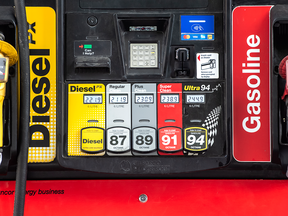HAPPY CANADA DAY! Ottawa Releases a “Second Carbon Tax” to Cut Vehicle Emissions
Happy Canada #HappyCanada

Move sets up a potential clash with the country’s hydrocarbon producing provinces
 The federal government has released a plan to compel refiners to add more “clean fuels” to vehicle gasoline to cut emissions. PHOTO BY PETER J. THOMPSON/NATIONAL POST The Clean Fuel Regulations aim to reduce emissions from motor fuels by 26.6 million metric tons by 2030, according to a statement from the Minister of Environment and Climate Change. The measures are similar to a program spearheaded by California decades ago, known as the Low Carbon Fuel Standard, that has also been adopted by Oregon and the province of British Columbia.The program is the latest initiative by Trudeau’s government to fight climate change while maintaining Canada’s position as one of the world’s biggest producers of oil and natural gas. The government plans to make Canada a net zero emitter by 2050 even as it pushes forward with plans to build a new oil pipeline from Alberta’s oilsands to the Pacific as well as new liquefied natural gas export terminals. The plan calls for credits to be issued to the makers of low-carbon fuels such as ethanol and biodiesel that can be sold to refiners and importers of gasoline and diesel derived from fossil fuels. Each year, the emissions intensity of motor fuel will be reduced, requiring more production of low-emitting alternatives. The clean fuel program has drawn opposition in Canada’s oil-producing provinces. Jason Kenney, Alberta’s premier, has previously tweeted that the clean fuel standard would constitute a “second carbon tax” and raise prices for consumers. The regulations announced Tuesday will go into effect next year to avoid any immediate impact on fuel prices, Steven Guilbeault, minister of environment and climate change said by phone. They will require the carbon intensity of gasoline and diesel to be reduced by about 11 per cent between 2023 and 2030.That will add an estimated 6 cents to 13 cents per litre to the cost of gasoline by 2030, said the minister. That price increase will be much less than the rise in profits earned by refiners, which have gone up more than 100 per cent in the past year, he said.
The federal government has released a plan to compel refiners to add more “clean fuels” to vehicle gasoline to cut emissions. PHOTO BY PETER J. THOMPSON/NATIONAL POST The Clean Fuel Regulations aim to reduce emissions from motor fuels by 26.6 million metric tons by 2030, according to a statement from the Minister of Environment and Climate Change. The measures are similar to a program spearheaded by California decades ago, known as the Low Carbon Fuel Standard, that has also been adopted by Oregon and the province of British Columbia.The program is the latest initiative by Trudeau’s government to fight climate change while maintaining Canada’s position as one of the world’s biggest producers of oil and natural gas. The government plans to make Canada a net zero emitter by 2050 even as it pushes forward with plans to build a new oil pipeline from Alberta’s oilsands to the Pacific as well as new liquefied natural gas export terminals. The plan calls for credits to be issued to the makers of low-carbon fuels such as ethanol and biodiesel that can be sold to refiners and importers of gasoline and diesel derived from fossil fuels. Each year, the emissions intensity of motor fuel will be reduced, requiring more production of low-emitting alternatives. The clean fuel program has drawn opposition in Canada’s oil-producing provinces. Jason Kenney, Alberta’s premier, has previously tweeted that the clean fuel standard would constitute a “second carbon tax” and raise prices for consumers. The regulations announced Tuesday will go into effect next year to avoid any immediate impact on fuel prices, Steven Guilbeault, minister of environment and climate change said by phone. They will require the carbon intensity of gasoline and diesel to be reduced by about 11 per cent between 2023 and 2030.That will add an estimated 6 cents to 13 cents per litre to the cost of gasoline by 2030, said the minister. That price increase will be much less than the rise in profits earned by refiners, which have gone up more than 100 per cent in the past year, he said.
“Oil companies have a lot of money now and they should be investing some of it to ensure they reduce their greenhouse gas emissions,” he said.
About 2.2 billion litres of additional low-carbon diesel and 700 million litres of additional ethanol will be needed in 2030 under the new program, the ministry said.
Bloomberg.com
Share This:
More News Articles